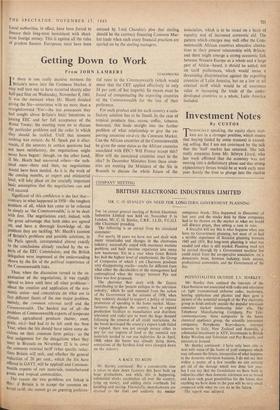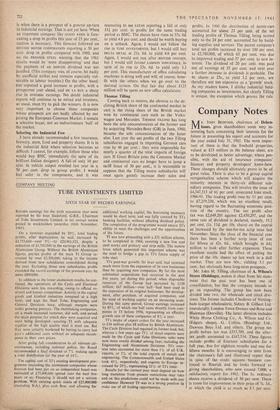Company Notes
IT is a moot point whether the great liners that have now been de- clared obsolete were most like floating hotels or en- tire floating towns; but there is no denying that their successors the air- liners are flying hospitals. The similarities are strik- ing. They never give you enough information; they keep on waking you UP to give you meals; and the whole mechanism is entirely without flexibility. Less than fifteen years since air travel became commonplace, the airlines are as set in their ways as the Roman Catholic Church; and the pity of it is that they seem never to have actually found out that human beings want to be happy and comfortable in the air.
In-Passengers
By KATHARINE WHITEHORN
Roundabout
that the lines make real profits, yet when a plane is full, the mechanisms for meals as often as not break down. It may take the stewardesses two hours to get round with cocktails for a plane- load of over a hundred, yet it is assumed that however much you may alter the engine and the number of passengers, the system of serving must always remain the same. Then there is this con- vention of free drink and food which absolutely must be offered, including, maddeningly, break- fast (often served an hour and a half before land- ing, after a night of perhaps four hours). A repre- sentative of El Al explained the difficulty to me: they have letters complaining about having break- fast, but if they stop they have other letters com- plaining there is none, so what can they do? Obviously, the simple answer is, ask the passen- gers what they want (imagine a hotel that either woke everyone up at 7 a.m. or provided no break- fast at all). But this is completely foreign to the whole manner of airline thinking, which assumes that passengers must be treated like sheep, and none too bright sheep at that. tight schedules and everyone must be dragooned to the minute to keep things running smoothly. But in fact the non-passenger side of things is incredibly erratic : people who seldom travel think any delay is a rare act of God, but anyone who travels regularly knows that hold-ups are almost as common as punctuality. This is fair enough; we would all rather they sent us up late in a mended plane than punctually in a faulty one; but why pretend that the thing works like clockwork and have no mechanisms for dealing with any situation that goes astray?







































 Previous page
Previous page